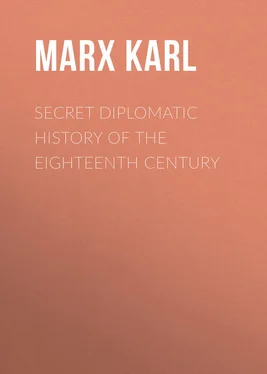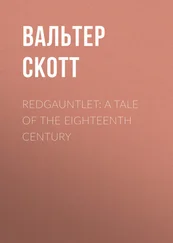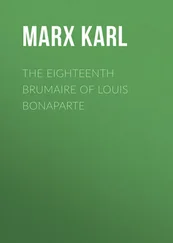Karl Marx - Secret Diplomatic History of The Eighteenth Century
Здесь есть возможность читать онлайн «Karl Marx - Secret Diplomatic History of The Eighteenth Century» — ознакомительный отрывок электронной книги совершенно бесплатно, а после прочтения отрывка купить полную версию. В некоторых случаях можно слушать аудио, скачать через торрент в формате fb2 и присутствует краткое содержание. Жанр: literature_19, foreign_antique, foreign_prose, на английском языке. Описание произведения, (предисловие) а так же отзывы посетителей доступны на портале библиотеки ЛибКат.
- Название:Secret Diplomatic History of The Eighteenth Century
- Автор:
- Жанр:
- Год:неизвестен
- ISBN:нет данных
- Рейтинг книги:4 / 5. Голосов: 1
-
Избранное:Добавить в избранное
- Отзывы:
-
Ваша оценка:
- 80
- 1
- 2
- 3
- 4
- 5
Secret Diplomatic History of The Eighteenth Century: краткое содержание, описание и аннотация
Предлагаем к чтению аннотацию, описание, краткое содержание или предисловие (зависит от того, что написал сам автор книги «Secret Diplomatic History of The Eighteenth Century»). Если вы не нашли необходимую информацию о книге — напишите в комментариях, мы постараемся отыскать её.
Secret Diplomatic History of The Eighteenth Century — читать онлайн ознакомительный отрывок
Ниже представлен текст книги, разбитый по страницам. Система сохранения места последней прочитанной страницы, позволяет с удобством читать онлайн бесплатно книгу «Secret Diplomatic History of The Eighteenth Century», без необходимости каждый раз заново искать на чём Вы остановились. Поставьте закладку, и сможете в любой момент перейти на страницу, на которой закончили чтение.
Интервал:
Закладка:
Karl Marx
Secret Diplomatic History of The Eighteenth Century
CHAPTER I
1 1 This letter relates to the war against Turkey, commenced by the Empress Ann in 1735. The British diplomatist at St. Petersburg is reporting about his endeavours to induce Russia to conclude peace with the Turks. The passages omitted are irrelevant.
" … I heartily wish … that the Turks could be brought to condescend to make the first step, for this Court seems resolved to hearken to nothing till that is done, to mortify the Porte, that has on all occasions spoken of the Russians with the greatest contempt, which the Czarina and her present Ministers cannot bear. Instead of being obliged to Sir Everard Fawkner and Mr. Thalman (the former the British, the latter the Dutch Ambassador at Constantinople), for informing them of the good dispositions of the Turks, Count Oestermann will not be persuaded that the Porte is sincere, and seemed very much surprised that they had written to them (the Russian Cabinet) without order of the King and the States-General, or without being desired by the Grand Vizier, and that their letter had not been concerted with the Emperor's Minister at Constantinople… I have shown Count Biron and Count Oestermann the two letters the Grand Vizier has written to the King, and at the same time told these gentlemen that as there was in them several hard reflections on this Court, I should not have communicated them if they had not been so desirous to see them. Count Biron said that was nothing, for they were used to be treated in this manner by the Turks. I desired their Excellencies not to let the Porte know that they had seen these letters, which would sooner aggravate matters than contribute to make them up…"
"Most Secret. 2 2 England was at that time negotiating a commercial treaty with Russia.
" … Yesterday M. Panin 3 3 To this time it has remained among historians a point of controversy, whether or not Panin was in the pay of Frederick II. of Prussia, and whether he was so behind the back of Catherine, or at her bidding. There can exist no doubt that Catherine II., in order to identify foreign Courts with Russian Ministers, allowed Russian Ministers ostensibly to identify themselves with foreign Courts. As to Panin in particular, the question is, however, decided by an authentic document which we believe has never been published. It proves that, having once become the man of Frederick II., he was forced to remain so at the risk of his honour, fortune and life.
and the Vice-Chancellor, together with M. Osten, the Danish Minister, signed a treaty of alliance between this Court and that of Copenhagen. By one of the articles, a war with Turkey is made a casus fœderis ; and whenever that event happens, Denmark binds herself to pay Russia a subsidy of 500,000 roubles per annum, by quarterly payments. Denmark also, by a most secret article, promises to disengage herself from all French connections, demanding only a limited time to endeavour to obtain the arrears due to her by the Court of France. At all events, she is immediately to enter into all the views of Russia in Sweden, and to act entirely, though not openly, with her in that kingdom. Either I am deceived or M. Gross 4 4 The Russian Minister at London.
has misunderstood his instructions, when he told your lordship that Russia intended to stop short, and leave all the burden of Sweden upon England. However desirous this Court may be that we should pay a large proportion of every pecuniary engagement, yet, I am assured, she will always choose to take the lead at Stockholm. Her design, her ardent wish, is to make a common cause with England and Denmark, for the total annihilation of the French interest there. This certainly cannot be done without a considerable expense; but Russia, at present, does not seem unreasonable enough to expect that WE SHOULD PAY THE WHOLE. It has been hinted to me that £1,500 per annum, on our part, would be sufficient to support our interest, and absolutely prevent the French from ever getting at Stockholm again.
"The Swedes, highly sensible of, and very much mortified at, the dependent situation they have been in for many years, are extremely jealous of every Power that intermeddles in their affairs, and particularly so of their neighbours the Russians. This is the reason assigned to me for this Court's desiring that we and they should act upon SEPARATE bottoms, still preserving between our respective Ministers a confidence without reserve. That our first care should be, not to establish a faction under the name of a Russian or of an English faction; but, as even the wisest men are imposed upon by a mere name, to endeavour to have OUR friends distinguished as the friends of liberty and independence. At present we have a superiority, and the generality of the nation is persuaded how very ruinous their French connections have been, and, if continued, how very destructive they will be of their true interests. M. Panin does by no means desire that the smallest change should be made in the constitution of Sweden. 5 5 The oligarchic Constitution set up by the Senate after the death of Charles XII.
He wishes that the royal authority might be preserved without being augmented, and that the privileges of the people should be continued without violation. He was not, however, without his fears of the ambitious and intriguing spirit of the Queen, but the great ministerial vigilance of Count Oestermann has now entirely quieted his apprehensions on that head.
"By this new alliance with Denmark, and by the success in Sweden, which this Court has no doubt of, if properly seconded, M. Panin will, in some measure, have brought to bear his grand scheme of uniting the Powers of the North. 6 6 Thus we learn from Sir George Macartney that what is commonly known as Lord Chatham's "grand conception of the Northern Alliance," was, in fact, Panin's "grand scheme of uniting the Powers of the North." Chatham was duped into fathering the Muscovite plan.
Nothing, then, will be wanted to render it entirely perfect, but the conclusion of a treaty alliance with Great Britain. I am persuaded this Court desires it most ardently. The Empress has expressed herself more than once, in terms that marked it strongly. Her ambition is to form, by such an union, a certain counterpoise to the family compact, 7 7 The compact between the Bourbons of France and Spain concluded at Paris on August, 1761.
and to disappoint, as much as possible, all the views of the Courts of Vienna and Versailles, against which she is irritated with uncommon resentment. I am not, however, to conceal from your lordship that we can have no hope of any such alliance, unless we agree, by some secret article, to pay a subsidy in case of a Turkish war, for no money will be desired from us, except upon an emergency of that nature. I flatter myself I have persuaded this Court of the unreasonableness of expecting any subsidy in time of peace, and that an alliance upon an equal footing will be more safe and more honourable for both nations. I can assure your lordship that a Turkish war's being a casus fœderis , inserted either in the body of the treaty or in a secret article, will be a sine quâ non in every negotiation we may have to open with this Court. The obstinacy of M. Panin upon that point is owing to the accident I am going to mention. When the treaty between the Emperor and the King of Prussia was in agitation, the Count Bestoucheff, who is a mortal enemy to the latter, proposed the Turkish clause, persuaded that the King of Prussia would never submit to it, and flattering himself with the hopes of blowing up that negotiation by his refusal. But this old politician, it seemed, was mistaken in his conjecture, for his Majesty immediately consented to the proposal on condition that Russia should make no alliance with any other Power but on the same terms. 8 8 This was a subterfuge on the part of Frederick II. The manner in which Frederick was forced into the arms of the Russian Alliance is plainly told by M. Koch, the French professor of diplomacy and teacher of Talleyrand. "Frederick II.," he says, "having been abandoned by the Cabinet of London, could not but attach himself to Russia." (See his History of the Revolutions in Europe .)
Интервал:
Закладка:
Похожие книги на «Secret Diplomatic History of The Eighteenth Century»
Представляем Вашему вниманию похожие книги на «Secret Diplomatic History of The Eighteenth Century» списком для выбора. Мы отобрали схожую по названию и смыслу литературу в надежде предоставить читателям больше вариантов отыскать новые, интересные, ещё непрочитанные произведения.
Обсуждение, отзывы о книге «Secret Diplomatic History of The Eighteenth Century» и просто собственные мнения читателей. Оставьте ваши комментарии, напишите, что Вы думаете о произведении, его смысле или главных героях. Укажите что конкретно понравилось, а что нет, и почему Вы так считаете.












